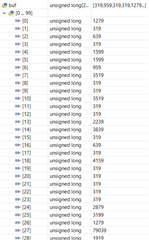Other Parts Discussed in Thread: C2000WARE
Hi Manoj,
Sorry to bother you again.
I have written the code in a different way, the program can read SDFM filter1 correctly,
but if I try to handle error (Modulator failure), the program keeps entering error handling ISR
PS_SdfmErrorIntr. The only different is to call the following function in a different way.
#if (1)
PS_SdfmSetErrVec(0, _Sd1Flt1ErrProc);
#else
PS_SdfmSetErrVec(0, NULL);
#endif
The above function call sets Sdfm1Regs.SDCPARM1.bit.MFIE to 1, and the another one
sets Sdfm1Regs.SDCPARM1.bit.MFIE to 0.
Do I have anything wrong in the code?
thanks,
Jiakai
PS: I have uploaded the project for you review. You need to set 2 include paths as below before compiling it.
${COM_TI_C2000WARE_SOFTWARE_PACKAGE_INSTALL_DIR}/device_support/f28004x/common/include
${COM_TI_C2000WARE_SOFTWARE_PACKAGE_INSTALL_DIR}/device_support/f28004x/headers/include



